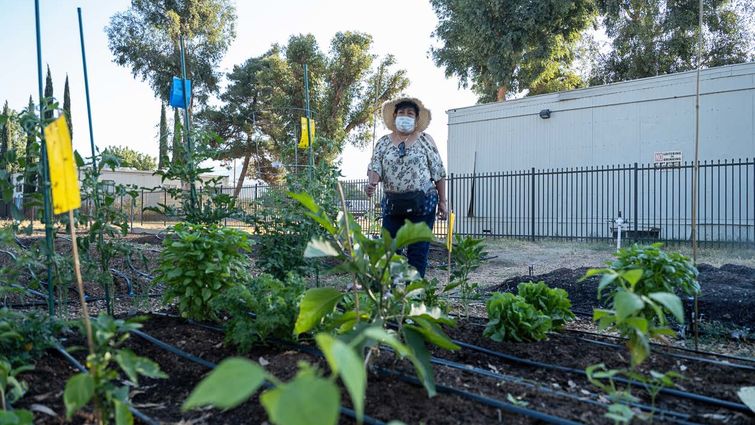
Families in San Bernardino will enjoy a Thanksgiving bounty of fresh fruits and vegetables they grew themselves thanks to Loma Linda University Health’s donation of a one-acre parcel to establish an organic community garden and outdoor activity center — aiming to improve nutrition and mental well-being among the underserved.
The city of San Bernardino is one of Southern California’s food deserts — areas where people have limited access to affordable, nutritious food due to poverty, food insecurity, access to grocery stores and lack of transportation.
“Jardín de la Salud,” Spanish for “Garden of Health,” is an initiative of the Loma Linda University Community-Academic Partners in Service (CAPS), part of the Institute for Community Partnerships (ICP), to provide wholesome produce and safe outdoor green spaces to the local underserved population.
Nearly 30 families received plots of land this summer to grow their own organic fruits and vegetables. Produce like tomatoes, bell peppers, chilis, eggplant, zucchini, beans, carrots and beets are being grown, feeding four or more people in a home.
Karla Estudillo-Fuentes, MPH, CAPS program manager, says families are passionate about not only eating more healthful but the mental health benefits that go along with the physical activity and gardening.
“Jardín de la Salud is community-led and community-built,” Estudillo-Fuentes says. Seven community members have already volunteered to be garden leaders, responsible for overseeing other volunteers, assisting with plot development and opening and closing the garden space.
Estudillo-Fuentes says a community planting area has recently been established, where fruits and vegetables grown are sold at the garden’s market — bringing fresh, organic produce at a low price to the community, helping to sustain the garden’s costs. The market is held the first Tuesday and third Sunday every month. Next summer’s garden harvest is estimated to fill 250 boxes of produce to be distributed to San Bernardino families in need, Estudillo-Fuentes says.
To help grow and maintain the garden, ICP partnered with Huerta del Valle, the city of Ontario’s first urban community farm. Initiated in 2010, this grassroots agricultural effort has become a hub for sustainable organic production and distribution, community health and economic development and nutrition education.
“Jardín de la Salud is truly a place where we focus on health, community building, mental health, nutrition, food justice, environmental justice and empowerment,” Estudillo-Fuentes says. “This garden and green space allows community members to learn more about their connection to the earth and feel empowered to address the health of their family and themselves — they are the ones that continue to make it fruitful every day.”
To learn more about our healthy living community programs, visit the Institute for Community Partnerships website.
